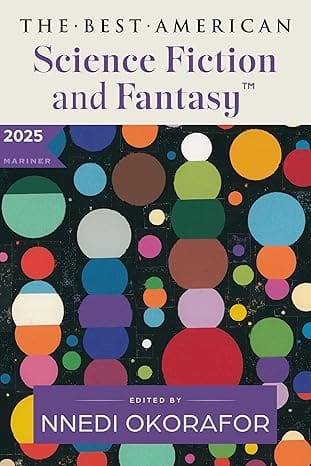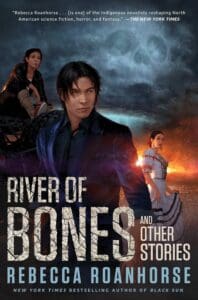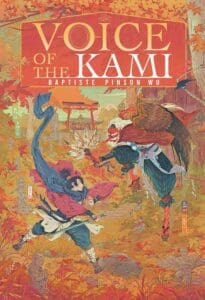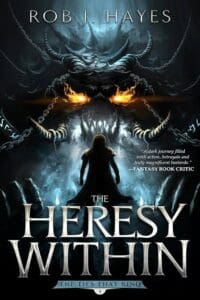
Synopsis:
A collection of the year’s best science fiction and fantasy short fiction selected by award-winning author of Death of the Author and the Binti Trilogy, Nnedi Okorafor, and series editor John Joseph Adams.
The Best American series, launched in 1915, is the premier annual showcase for the country’s finest short fiction and nonfiction, and it is the most respected—and most popular—of its kind.
Nnedi Okorafor selects twenty pieces that represent the best examples of the form published the previous year and explores the ever-expanding and changing world of science fiction and fantasy today.
Review:
If you love short fiction in the sci-fi, fantasy, and horror genres, you really can’t go wrong with the annual edition of The Best American Science Fiction and Fantasy. John Joseph Adams has been the overall series editor since the series’ introduction back in 2015 and each year he selects a guest editor to shape that year’s volume. This year he’s brought on Nnedi Okarafor (Binti, The Death of the Author) to put her own spin on the list. After enjoying the audiobook of the collection, I’ll say a few stories didn’t quite vibe with me as much as the majority did, but I can’t deny the quality of the writing and ideas contained in this collection.
When I review short fiction anthologies, I like to just talk about a few of the stories, so here are my notes and favorites from the book:
- The anthology starts with Caroline M. Yoachim’s story We Will Teach You How to Read | We Will Teach You How to Read, first published by Lightspeed Magazine. Right off the bat, I kinda thought I was going insane. Yoachaim’s story is deep, moving, and intriguing…but my ARC was an audiobook. Yoachim’s story is written specifically for the page or screen as she plays with formatting, margins, and the human ability to read and retain different amounts of information simultaneously. I’m not going to say it doesn’t translate to an audiobook…but I would definitely recommend finding the print version of this story as you listen. It’s a special work, but it really is something that can’t really be replicated in aural form.
- One of the great things about collections like this is discovering new writers, but also connections to previous classics that maybe you haven’t come across before. When I was reading about the story Why Don’t We Just Kill the Kid in the Omelas Hole by Isabel J. Kim, I saw that it was a response or homage to The Ones Who Walk Away from Omelas by Ursula K. Le Guin, a 1973 short story that won the Hugo Award the next year. Le Guin’s story is a philosophical fantasy story that really is a ethical dilemma presented in story form – what if a perfect city exists, but that perfection is predicated on the suffering of one specific child? In Le Guin’s classic, those who find this proposition troubling simply leave town, never to return. For Isabel J. Kim, the ethical dilemma is solved by much more violent means. It’s fascinating and touches very close to home, especially as you see the news each day.
- The Audit by Olivie Blake is a meandering view of a future that could be possible. In Blake’s possible future, people can opt into a trial program to gauge their earning potential over their lifetime to receive that money now – before age 30 – so that retirement isn’t “wasted” on the old. In The Audit, a woman is given $40 million to enjoy her life, but instead of going out and living it up, she spirals, suddenly unsure of herself and if she’s worthy of the money. An agoraphobic neighbor befriends her and offers perspective as she works through her issues. Ultimately, there’s not at lot of “sci-fi” to the story other than the initial premise, but that’s okay. I found the “slice of life” aspect to the story a wonderful grounding presence.
- And in a completely different way, I really enjoyed The River Judge by S.L. Huang. It is expertly told and visceral in how it handles the characters. I was reminded of a story from early pioneer days along the Ohio River where a man and wife ran an inn. When certain people (rich, less likely to be missed by family, etc.) would visit the inn, many times they never truly checked out; their bodies were filled with stones and sunk in the nearby river. One day their son visits, but thanks to a beard and age, they don’t recognize him, and tragedy befalls the family. This is not that story, but there were similar notes to it in my mind. For Huang, she also adds a horror beat to the entire affair that is delightfully gross.
- Ushers by Joe Hill. Nothing negative to say about Joe Hill. The story here initially felt to me a bit like the movie Unbreakable from M. Night Shyamalan. Two police detectives are investigating a train crash and one survivor seems a bit suspicious. He’s previously missed out on a school shooting when he was in high school so I felt the story was heading one way when Hill pulled the rug out from under me. I loved the reveal of what was actually happening and the wonderful horror-turn at the end sealed it as one of my favorites.
Like I said, I loved nearly all of the stories to one degree or another. Only one or two didn’t vibe with me, but I still appreciated the writing and could tell what the author was going for. As guest editor, Nnedi Okorafor leaned a little heavier on the horror/supernatural angle, but there is a good mix of fantasy and sci-fi in this volume. If you like short genre fiction, I highly encourage you to pick up The Best American Science Fiction and Fantasy 2025.
Thank you to Mariner Books for providing this audiobook for review consideration via NetGalley. All opinions are my own.










Leave a Reply